1967
1 janvier 1967 : Tristan und Isolde. Opéra royal de Stockholm. Varviso. Neate. Rundgren. Birgit Nilsson (Isolde). Saeden. Brilioth. Meyer.
1 janvier 1967 : THE BELL TELEPHONE HOUR - FIRST LADIES OF THE OPERA. Film TV de Kirk Browning. This week, showcasing the talents and careers of a swedish dramatic soprano (Birgit Nilsson), an american soprano (Leontyne Price), an australian dramatic coloratura soprano (Joan Sutherland) and an italian lirico-spinto soprano (Renata Tebaldi). The four opera singers discuss the art of the prima donna with host Voorhees and perform their favorite arias, starting with Nilsson, who interprets Wagner's Tannhauser "Dick, teure halle" and Puccini's Turandot "In questa reggia", followed by Price, who sings an aria from Cilea's "Adriana Lecouvreur," and "Pace, Pace, Mio Dio" from "La Forza Del Destino", then Sutherland, who sings the "Bell Song" from "Lakme" and an aria from Luigi and Federico Ricci's "Crispino e la Comare", and concluding with Tebaldi who sings "Voi Lo Sapete" from "Cavalleria Rusticana," and "Suicidio" from "La Gioconda." (Rod Duncan)
6 janvier 1967 : Turandot. Londres, Royal Opera House Covent Garden. Mackerras. Pellegrini. McCracken. Rouleau. Bowman. Birgit Nilsson (Turandot).
26 janvier 1967 : Turandot. Staatsoper de Vienne. Klobucar. Birgit Nilsson (Turandot). Klein. Franc. King. Gueden.
30 janvier 1967 : Elektra. Staatsoper de Vienne. Klobucar. Resnik. Birgit Nilsson (Elektra). Rysanek. Windgassen. Nienstedt.
4 février 1967 : Turandot. Staatsoper de Vienne. Klobucar. Birgit Nilsson (Turandot). Klein. Franc. Zampieri. Lotte Rysanek..
7 février 1967 : Elektra. Staatsoper de Vienne. Klobucar. Resnik. Birgit Nilsson (Elektra). Rysanek. Stolze. Nienstedt.
11 février 1967 : Tristan und Isolde. Staatsoper de Vienne. Varviso. Windgassen. Kreppel. Birgit Nilsson (Isolde). Imdahl. Braun. Hoffman.
16 février 1967 : Tosca. Opéra royal de Stockholm. Westerberg. Birgit Nilsson (Floria Tosca). Ulfung. Bjorling.
19 février 1967 : Tristan und Isolde. Opéra royal de Stockholm. Varviso. Neate. Rundgren. Birgit Nilsson (Isolde). Saeden. Brilioth. Ericson.
25 février au 5 mars 1967 : Enregistrement à Prague de DON GIOVANNI avec Böhm. Fischer-Dieskau. Flagello. Birgit Nilsson (Donna Anna). Schreier. Arroyo. Talvela. Grist. Mariotti. ENREGISTREMENT STUDIO.
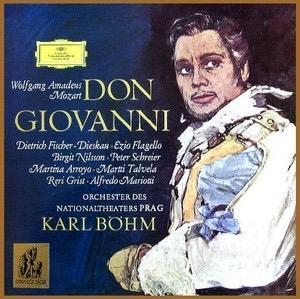
10 mars 1967 : Salomé. Scala de Milan. Klobucar. Parly. Madeira. Birgit Nilsson (Salomé). Nocker. Peterson. ENREGISTREMENT LIVE.
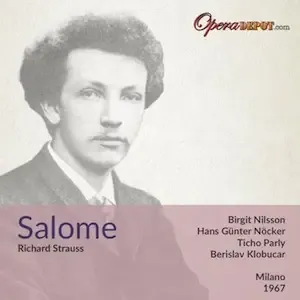
13 mars 1967 : Salomé. Scala de Milan. Klobucar. Parly. Madeira. Birgit Nilsson (Salomé). Nocker. Peterson.
17 mars 1967 : Salomé. Scala de Milan. Klobucar. Parly. Madeira. Birgit Nilsson (Salomé). Nocker. Peterson.
20 mars 1967 : Salomé. Scala de Milan. Klobucar. Parly. Madeira. Birgit Nilsson (Salomé). Nocker. Peterson.
23 mars 1967 : Salomé. Scala de Milan. Klobucar. Parly. Madeira. Birgit Nilsson (Salomé). Nocker. Peterson.
28 mars 1967 : STIMULANTIA. Un film suédois en huit épisodes. L’ épisode consacré à Birgit Nilsson a été réalisé par Arne Arnbom. Durée du film : 1h45. Stig Westerberg / Birgit Nilsson / orchestre de la radio : Mild und leise (Tristan und Isolde). ENREGISTREMENT STUDIO.
10 avril 1967 : Tristan und Isolde. Osaka. Film réalisé par la télévision japonaise d’une représentation à Osaka de la production de Wieland Wagner au Festival de Bayreuth. Boulez. Windgassen. Birgit Nilsson (Isolde). Andersson. Hotter. Nienstedt. Topper. ENREGISTREMENT LIVE.
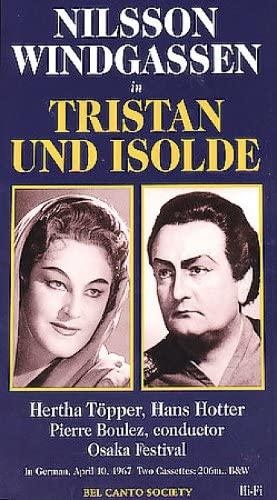
3 mai 1967 : Turandot. Atlanta. Adler. Birgit Nilsson (Turandot). McCracken. Moffo. Giaiotti. Velis.
9 mai 1967 : Turandot. Memphis. Adler. Birgit Nilsson (Turandot). McCracken. Tucci. Michalski. Velis.
13 mai 1967 : Turandot. Dallas. Mehta. Birgit Nilsson (Turandot). McCracken. Tucci. Michalski. Velis.
16 mai 1967 : Aida. Minneapolis. Schippers. Birgit Nilsson (Aida). McCracken. Rankin. Guarrera. Macurdy. Michalski.
21 mai 1967 : TOAST OF THE TOWN 20.37. Émission TV de John Moffitt avec Ed Sullivan, Petula Clark, Jean Drapeau, Pierre Dupuy, les Faux Follets, Peter Gennaro, Alan King, Claude Leveillée, The Montreal symphony orchestra, Ralph Paul, Birgit Nilsson qui chante in questa reggia (Turandot) accompagnée par l’ orchestre symphonique de Montréal.
23 mai 1967 : Turandot. Détroit. Mehta. Birgit Nilsson (Turandot). Corelli. Moffo. Giaiotti. Velis.
Review of Collins George in the Detroit Free Press
PRINCIPALS ARE SUPERB: The Met Surpasses Itself with Brilliant 'Turandot'
"Turandot," which Metropolitan Opera played Tuesday at Masonic Auditorium, has always been one of the company's most brilliant productions. It was so when the company opened its season here with it six years ago. It was more so Tuesday. The same principals were there - Birgit Nilsson as the Princess Turandot and Franco Corelli as the Prince Calaf, who successfully guesses the princess' three riddles and eventually gains her love. To that extent - the principals, the superb settings and costumes - the production was like the first one.
The added brilliance came from three things.
First, Corelli used to be content to adopt an open-legged stance and bellow. His voice is the finest and fullest tenor on the stage today. He has learned to discipline that voice and to act, both with his vocal chords and his body.
The second point was the choice this year of Liu the slave girl who dies for love of the prince. This time it was Anna Motto, who is a beautiful woman despite the fright wig she wore and has one of the loveliest lyric sopranos in the world.
To add to the excellence, conducting was Zubin Mehta, a great conductor both of opera and symphony. There were occasions when the orchestra sounded a bit loud, but "Turandot" is not an opera to be played softly.
As for Miss Nilsson, her voice - hard, true and brilliant - couldn't be bettered. As in
the first performance, she was perfection. One can hardly write about "Turandot" without mentioning the commissioners Ping, Pang and Pong, sung and acted delightfully, especially in their second act scene, by Frank Guarrera, Robert Nagy and Charles Anthony.
In short, the Metropolitan's performance of Puccini's last opera, continued to justify the troupe's reputation thoroughness and brilliance:
29 mai 1967 : Turandot. Philadelphie. Mehta. Birgit Nilsson (Turandot). Corelli. Tucci. Giaiotti. Velis.
Review of Max de Schauensee in the Bulletin (Philadelphia)
The Met Returns With 'Turandot'
Sound Softened After First Act, Opera Passes Test in Big Hall
The Metropolitan Opera returned to Philadelphia last night after more than a six year silence. It was on March 21, 1961 that the Metropolitan last appeared here with oddly enough, the same opera that marks its return - Giacomo Puccini's "Turandot." Even some of the singers, notably Birgit Nilsson, Franco Corelli, and Philadelphian Frank Guarrera, were the same.
Here, however, the sameness ended. The present return of the Metropolitan to Philadelphia is a courageously challenged experiment. Instead of the Academy of Music, we have the far larger, reconditioned Civic Center.
Instead of the final weeks of October - when the 1961 season began - we are about to greet the month of June. The size and character of the audience also is different, and the size of the present auditorium must be taken into account in more ways than one.
Last night's [start] of the Met's one-week season was a confirmed and deserved success. A huge and responsive crown attended. Everything worked smoothly except the amplification during the first act. Here it sounded much too loud and resultingly metallic. But by Act Two, things were nicely adjusted. And during the final act, you were hardly conscious of the added volume - at least not from Row M downstairs where I was sitting.
Since the Civic Center is co-used for sporting events, contains vast spaces, an opera of a spectacular rather than intimate character is indicated as better suited to these distances.
"Turandot" is such opera and Puccini's scoring is good and loud with its strong demand for stentorian voices. It is difficult to image more suitable voices than those of Mme. Nilsson and Mr. Corelli for the roles of Turandot and Calaf. The soprano has a trumpet in her throat and a dead-center attack on the uppermost note which are sensational. She has softened and improved her characterization of the icy Chinese princess and remains undoubtedly the Turandot of our day.
Mr. Corelli sang splendidly and looked handsome. He stopped the show with his melodious "Nessun dorma" and its climatic high B. This good-looking fellow had himself a time all evening; so did the enthusiastic fans.
4 juin 1967 : Tristan und Isolde. Opéra royal de Stockholm. Varviso. Neate. Rundgren. Birgit Nilsson (Isolde). Saeden. Brilioth. Meyer.
Juin - août 1967 : Aida. Rome. Mehta. Corelli. Birgit Nilsson (Aida). Bumbry. Sereni. Giaiotti. ENREGISTREMENT STUDIO.
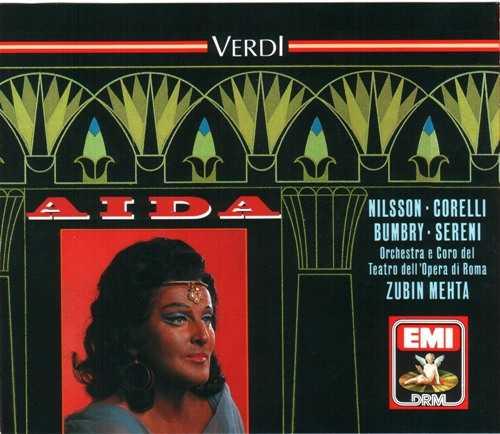
17 juin 1967 : Tristan und Isolde. Staatsoper de Vienne. Varviso. Martell. Kreppel. Birgit Nilsson (Isolde). Metternich. Braun. Hoffman.
22 juin 1967 ; Interview de Birgit Nilsson par Erich Schenk (47 min.)
22 juin 1967 : Turandot. Staatsoper de Vienne. Klobucar. Birgit Nilsson (Turandot). Equiluz. Arie. McCracken. Gueden.
23 juillet 1967 : Die Walkure. Festival de Bayreuth. Bohm. King. Nienstedt. Adam. Birgit Nilsson (Brunnhilde). Rysanek. Burmeister. ENREGISTREMENT LIVE.
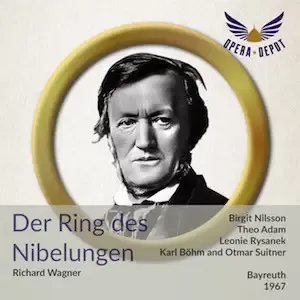
25 juillet 1967 : Siegfried. Festival de Bayreuth. Bohm. Windgassen. Wohlfahrt. Adam. Neidlinger. Bohme. Hoffgen. Birgit Nilsson (Brunnhilde). ENREGISTREMENT LIVE.
27 juillet 1967 : Die Gotterdammerung. Festival de Bayreuth. Bohm. Windgassen. Birgit Nilsson (Brunnhilde). Stewart. Dvorakova. Greindl. Neidlinger. Modl. ENREGISTREMENT LIVE.
Juillet - août 1967 : Die Walkure. Festival de Bayreuth. Bohm. King. Nienstedt. Adam. Birgit Nilsson (Brunnhilde). Rysanek. Burmeister. ENREGISTREMENT COMPILATION LIVE.
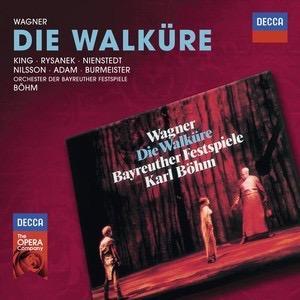
Juillet - août 1967 : Siegfried. Festival de Bayreuth. Bohm. Windgassen. Wohlfahrt. Adam. Neidlinger. Bohme. Soukupova. Birgit Nilsson (Brunnhilde). ENREGISTREMENT COMPILATION LIVE.
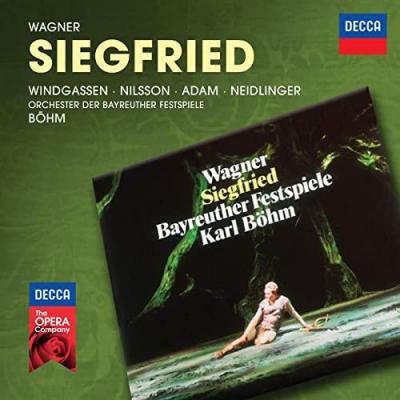
Juillet - août 1967 : Die Gotterdammerung. Festival de Bayreuth. Bohm. Windgassen. Birgit Nilsson (Brunnhilde). Stewart. Dvorakova. Greindl. ENREGISTREMENT COMPILATION LIVE.
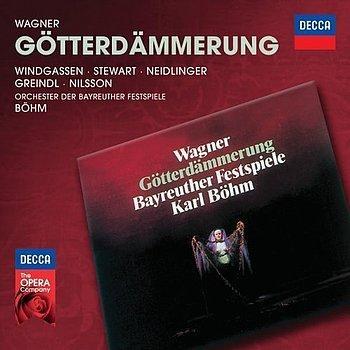
10 août 1967 : Die Walkure. Festival de Bayreuth. Bohm. King. Nienstedt. Adam. Birgit Nilsson (Brunnhilde). Rysanek. Burmeister.
12 août 1967 : Siegfried. Festival de Bayreuth. Bohm. Windgassen. Wohlfahrt. Adam. Neidlinger. Bohme. Hoffgen. Birgit Nilsson (Brunnhilde).
14 août 1967 : Die Gotterdammerung. Festival de Bayreuth. Bohm. Windgassen. Birgit Nilsson (Brunnhilde). Stewart. Dvorakova. Greindl. Neidlinger. Modl.
5 septembre 1967 : Tosca. Opéra royal de Stockholm. Gregor. Birgit Nilsson (Floria Tosca). Ulfung. Jupither.
14 septembre 1967 : Elektra. Staatsoper de Vienne en tournée à Montreal. Bohm. Resnik. Birgit Nilsson (Elektra). Rysanek. Uhl. Nienstedt.
18 septembre 1967 : Elektra. Staatsoper de Vienne en tournée à Montreal. Bohm. Resnik. Birgit Nilsson (Elektra). Rysanek. Uhl. Nienstedt. ENREGISTREMENT LIVE.
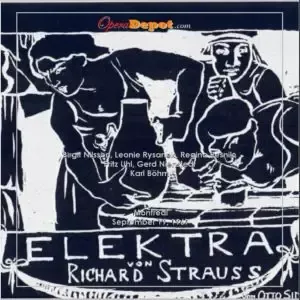
29 septembre 1967 : Die Walkure. Teatro Colon Buenos Aires. Leitner. Martell. Hagenau. Ward. Jones. Birgit Nilsson (Brunnhilde). Hoffman. ENREGISTREMENT LIVE.
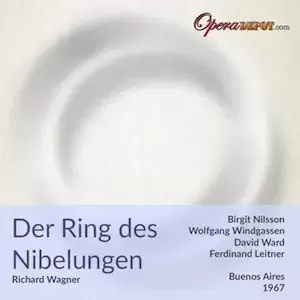
1 octobre 1967 : Die Walkure. Teatro Colon Buenos Aires. Leitner. Martell. Hagenau / Langdon. Ward / Giongo. Jones. Birgit Nilsson / Amy Shuard (Brunnhilde). Hoffman.
3 octobre 1967 : Die Walkure. Teatro Colon Buenos Aires. Leitner. Martell. Hagenau / Langdon. Ward / Giongo. Jones. Birgit Nilsson / Amy Shuard (Brunnhilde). Hoffman.
5 octobre 1967 : Die Walkure. Teatro Colon Buenos Aires. Leitner. Martell. Hagenau / Langdon. Ward / Giongo. Jones. Birgit Nilsson / Amy Shuard (Brunnhilde). Hoffman.
7 octobre 1967 : Die Walkure. Teatro Colon Buenos Aires. Leitner. Martell. Hagenau / Langdon. Ward / Giongo. Jones. Birgit Nilsson / Amy Shuard (Brunnhilde). Hoffman.
12 octobre 1967 : Die Walkure. Teatro Colon Buenos Aires. Leitner. Martell. Hagenau / Langdon. Ward / Giongo. Jones. Birgit Nilsson / Amy Shuard (Brunnhilde). Hoffman.
13 octobre 1967 : Siegfried. Teatro Colon Buenos Aires. Leitner. Windgassen. Wohlfahrt. Ward. Kelemen. Langdon. Wien. Birgit Nilsson (Brunnhilde). ENREGISTREMENT LIVE.
15 octobre 1967 : Siegfried. Teatro Colon Buenos Aires. Leitner. Windgassen. Wohlfahrt. Ward / Giongo. Kelemen. Langdon. Hoffgen / Wien. Birgit Nilsson / Amy Shuard (Brunnhilde).
17 octobre 1967 : Siegfried. Teatro Colon Buenos Aires. Leitner. Windgassen. Wohlfahrt. Ward / Giongo. Kelemen. Langdon. Hoffgen / Wien. Birgit Nilsson / Amy Shuard (Brunnhilde).
19 octobre 1967 : Siegfried. Teatro Colon Buenos Aires. Leitner. Windgassen. Wohlfahrt. Ward / Giongo. Kelemen. Langdon. Hoffgen / Wien. Birgit Nilsson / Amy Shuard (Brunnhilde).
24 octobre 1967 : Siegfried. Teatro Colon Buenos Aires. Leitner. Windgassen. Wohlfahrt. Ward / Giongo. Kelemen. Langdon. Hoffgen / Wien. Birgit Nilsson / Amy Shuard (Brunnhilde).
27 octobre 1967 : Die Gotterdammerung. Teatro Colon Buenos Aires. Leitner. Birgit Nilsson / Amy Shuard (Brunnhilde). Windgassen. Giongo. Hagenau. Jones. Hoffman. Kelemen / Mattielo.
29 octobre 1967 : Die Gotterdammerung. Teatro Colon Buenos Aires. Leitner. Birgit Nilsson / Amy Shuard (Brunnhilde). Windgassen. Giongo. Hagenau. Jones. Hoffman. Kelemen / Mattielo.
31 octobre 1967 : Die Gotterdammerung. Teatro Colon Buenos Aires. Leitner. Windgassen. Birgit Nilsson (Brunnhilde). Giongo. Jones. Hagenau. ENREGISTREMENT LIVE.
3 novembre 1967 : Die Gotterdammerung. Teatro Colon Buenos Aires. Leitner. Birgit Nilsson / Amy Shuard (Brunnhilde). Windgassen. Giongo. Hagenau. Jones. Hoffman. Kelemen / Mattielo.
5 novembre 1967 : Die Gotterdammerung. Teatro Colon Buenos Aires. Leitner. Birgit Nilsson / Amy Shuard (Brunnhilde). Windgassen. Giongo. Hagenau. Jones. Hoffman. Kelemen / Mattielo.
12 novembre 1967 : New York Philharmonic Hall. Lincoln center. Concert Birgit Nilsson / John Wustman (piano).
21 novembre 1967 : Die Walkure. Metropolitan opéra de New York (400eme représentation de cette œuvre au Met). Karajan. Birgit Nilsson (Brunnhilde). Vickers. Janowitz. Stewart. Ludwig. Ridderbusch.
24 novembre 1967 : Die Walkure. Metropolitan opéra de New York. Karajan. Birgit Nilsson (Brunnhilde). Vickers. Janowitz. Stewart. Ludwig. Ridderbusch.
27 novembre 1967 : Die Walkure. Metropolitan opéra de New York. Karajan. Birgit Nilsson (Brunnhilde). Vickers. Janowitz. Berry. Ludwig. Ridderbusch. 100ème BRUNNHILDE.
2 décembre 1967 : Die Walkure. Metropolitan opéra de New York. Karajan. Birgit Nilsson (Brunnhilde). Vickers. Crespin. Stewart. Ludwig. Ridderbusch.
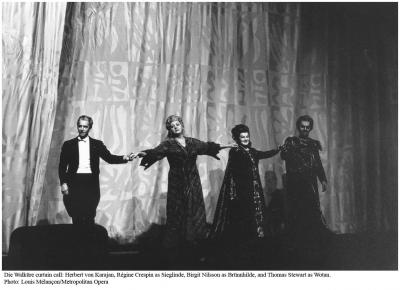
Review of Conrad L. Osborne in the London Times dated December 14, 1967
I wonder if there has been in our time a lesson in cultural politicking like that taught by the von Karajan Ring Cycle. Here is a production created in two major centers, one an important spring festival, the other an international opera house, the joint nature of the enterprise being used as amortization against what would otherwise be prohibitive costs in time and money. And here is direct and indirect financial support being drawn from the contemporary equivalence of the bygone patrons of art: the other, wealthier entertainment media (television, films and a record company, on the German side) and a huge corporation of expansive outlook (Eastern Airlines, underwriter on the American side to the tune of $500,000). Pre-requisite: a man who combines artistic stature with a feel for power.
The first section of the cycle to be placed on view at the Met is "Die Walküre." There has been a fair amount of grousing about it, and I have my reservations, too. But it is incomparably the best Wagner to have been seen and heard at the Met in many years.
To begin (and end, too. I suppose), this is Wagner in the hands of a brilliant, imaginative conductor. It is true, that this conductor's concept is a subject of legitimate controversy, but it is still the thought-out product of a superior musical mind. As it happens, I sympathize with Karajan's approach; I found this the most cohesive and beautiful reading of "Die Walküre" in my experience. Most of the complaints center around the first act, but Acts 2 and 3 are proportioned logically in relation to it; it is simply that the scoring of the first act is far lighter and more lyrical than that of the succeeding acts, due to the obvious differences in the nature of the dramatic materials.
After looking through and listening to the comments that followed the first night, I was prepared for an understated reading but found simply a scaled reading, one that kept magnificent balance between pit and stage; that maintained sensible proportion so that climaxes were climaxes, and not just the louder following the loud, and that exuded a subtle but unmistakable tension that drew one into the drama and "forced" one to listen. And that is what happened; for once, a Met audience shut up and paid attention, intent on the progress of the narrative and on the lovely things that were happening in the pit.
Karajan has the wonderful gift of projecting this music in such a way that it seems to happening for the first time (the very rare and precious quality striven for by serious actors and singers), so that though one knows perfectly well what is coming next, one nevertheless leans forward in anticipation to hear it unfold. My own few moments of impatience had nothing to do with the level of volume, which I found entirely satisfying, but with the impulse of the tempo at two or three climatic moments, where both I and the singers longed for a slight quickening which Karajan was not about to grant us.
Acts 2 and 3 were simply stupendous - extraordinary colour and balance and rhythmic rightness, and a delicious quality that I can only call "wholeness" in the sound, so that the clarity was achieved without vivisection of the score. It remains to be said that the difference between the playing secured from the orchestra under Karajan and that secured on an average good Metropolitan evening is downright embarrassing; on the occasion I heard "Die Walküre" the brass tired in the third act but even the occasional resulting burbles would hardly detract from the gorgeous overall impression. I guess that some hearers are bothered by the fact that the singers are so consistently audible. We heard every word, every note, we followed the singers and went with them. In other words, Karajan is doing what used to be considered the essential task of any competent operatic conductor: accompanying.
As a director, Karajan is on shakier ground. But again, I'm afraid I feel that the thing everyone is complaining about is being done rather well, while the things that are really being fluffed have stirred no notice. For some reason, everyone is suddenly concerned about lighting. Folk who make no murmur season in, season out at light plots which apparently consist of throwing a master switch profess acute discomfort over the dimness of the stage picture. Nonsense. This "Walküre" is intelligently and poetically lit. It is prevailing dark because it is supposed to be prevailingly dark. The essential mood of each scene is sensitively set, the transitions are steady and well matched to the score, and the principals are lit in a manner that is understated and subtle, but entirely clear and distinct. The lighting scheme allows for the necessary forming and reforming of Günther Schneider-Siemensen's set, and lets it happen in a natural, albeit eminently theatrical way.
The real problems relate to the behavior of the principals. There is almost never anything specific enough to illuminate the relationships of the characters or to humanize their motives; nearly all the blocking is unimaginative, and some of it (in Act 1 particularly) is almost amateurish. When a character stands or sits or makes a cross, there must be a reason, and the reason most be organic not only to the Meaning of the Drama (?), but to the character himself. It's not happening.
Schneider-Siemssen's sets are built around a ring unit. It has some obvious advantages and is being used here in a flexible and logical way. I do not see how a sensible judgment can be made until we have it in the context of the whole cycle. The projections include some striking effects, and the fire business is tolerably well done - gone forever, I assume, is the backroom-of-the-laundry effect we used to get with all that hissing steam.
Despite some new characterizations, comment on the individual singers must start with Nilsson. She was in finest voice, and has improved her Brünnhilde in every respect over the past few season. There is now no qualification one can make to keep it from the ranks of the greatest; she is thrilling and moving. She has even incorporated the swoops in the Battle Cry, where she always used to break off for a fresh attack on the top B's and C's. Since she is one of the few dramatic sopranos with absolute security in that territory, and one of the few who can carry up the full volume of her voice without weighting it down, the effect is hair-raising. The usual Sieglinde to date has been Gundula Janowitz, well received in her first appearance here. For the performance I attended, she fell ill and was replaced by Regine Crespin, laterally (and again presently) a Brünnhilde, I was sorry not to hear Miss Janowitz, but not a bit sorry to hear Crespin, who was in her very top form and did some great singing of her own. A rare pleasure, the remarkable adequacy of her lovely voice in "Der Männer sippe," the fullness of her first act climaxes, the despairing passion of her second act, and most of all the roof-raising outpouring of warm, round sound at Sieglinde's last and greatest moment, "O hehrestes Wunder!" Nilsson and Crespin spurring each other on make for the sort of thing one remembers with a chill for years.
Christa Ludwig, the Fricka, started rather bumpily, but warmed to a good second half of her scene. Jon Vickers was unfortunately bothered by some sort of indisposition (a call for Ticho Parly was circulating before the performance), which seemed to hamper him most in the lower octave of his voice, so that much of his Siegmund made less than its normal effect. He seemed to have sung through the difficulty by Act 2, which was close to his normal impressive level.
The Wotan, Thomas Stewart, has in my opinion been accorded less than his due. It is perfectly true that his voice is not of an ideal weight and size for this role, and further that there were enough moments of insecurity to make one wonder whether or not he can adjust to it healthily. But in a field which has included, of late at the Met, Otto Edelmann, Hermann Uhde, Randolph Symonette, and a past-his-best George London, Mr. Stewart is far from the bottom of the class; it is a highly intelligent, sensitive portrayal, distinguished by splendid projection of the text, but utter honesty and seriousness from beginning to end, by a number of thoughtful and original concepts, and by a vocal approach which is much closer to real singing than is the present-day norm. The sound is basically full, warm, and attractive, the range sufficient, the phrasing musical. One hopes that he finds the technical resource to sing the part safely without stinting on the essentials, for he is a satisfying artist.
As Hunding we had Karl Ridderbusch, a new German bass who came in place of the originally-announced Martti Talvela. He has a large, appealing bass voice which seems not entirely settled in, very imposing moments are followed by rather tentative ones. The Walküres were sanely cast, and produced good ensemble. The ticket lines have been long, and they can't all be Eastern Airlines employees.
5 décembre 1967 : Die Walkure. Metropolitan opéra de New York. Karajan. Birgit Nilsson (Brunnhilde). Vickers. Crespin. Berry (acte 2) / Stewart (acte 3). Ludwig. Ridderbusch.
17 décembre 1967 : Tristan und Isolde. Staatsoper de Vienne. Bohm. Thomas. Talvela. Birgit Nilsson (Isolde). Wiener. Bunger. Hesse.
22 décembre 1967 : Tristan und Isolde. Staatsoper de Vienne. Bohm. Thomas. Kreppel. Birgit Nilsson (Isolde). Wiener. Bunger. Hesse.
31 décembre 1967 : AUS BURG UND OPER. Heinz Fischer-Karwin : Gespraech mit Birgit Nilsson ueber die bevorstehende Premiere von Tristan und Isolde.
Mise à jour : 20230724 Pierre Marchais